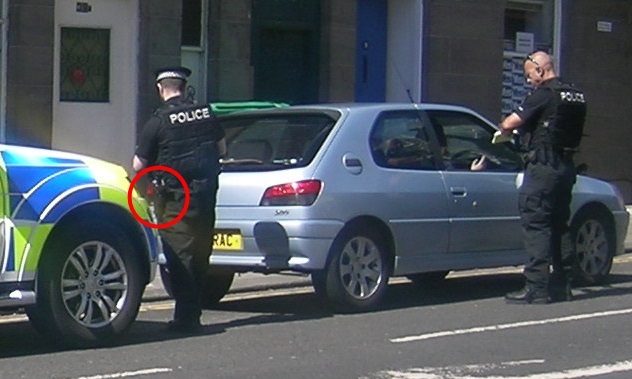Public concern about armed police attending routine calls “may have been less widespread than media and civic comment suggested”, Police Scotland’s civilian watchdog has claimed.
A narrow majority (53%) supported the standing authority of police to carry side arms and tasers, a survey of 1,000 people for the Scottish Police Authority (SPA) in October and November found.
Some MSP and civic groups complained when it emerged that armed officers had been seen attending routine incidents such as road traffic accidents and minor crimes.
Police Scotland initially said the officers were the closest to the scene and fulfilling their duty to respond quickly, but they later reviewed the policy following the public outcry and withdrew armed police from routine calls.
The SPA will today publish a report of its scrutiny inquiry into the impact of Police Scotland’s standing authority for firearms officers.
Police Scotland has about 275 trained officers attached to armed response vehicles and who carry side arms and tasers representing just under 2% of the total officers in Scotland.
Today’s inquiry report will say that “public concerns about the original deployment policy may have been less widespread than media and civic comment suggested”.
“A survey of over 1,000 people carried out for the SPA in October and November last year found that a narrow majority of those surveyed supported the armed policing policy,” the SPA said.
Three-quarters of people felt the guns policy had not affected their confidence and trust in Police Scotland, the survey found.
However, written and public responses to the inquiry suggest Police Scotland “underestimated the strength of community feelings that would be generated among a significant minority of the population, and the extent to which the approach on armed policing would be seen as a major change in policing style”.
Police Scotland has also been criticised by some for allegedly bringing city-style policing to rural areas.
The report recommends that Police Scotland should ensure that “all operational polices are subject to community impact assessments and to ensure that ‘equal’ access to specialist services is not automatically interpreted as the ‘same’ access to such services”.
Police must carry out greater and earlier engagement on the development of future police strategies and policies in future, particularly over guns, where the SPA and wider community should be consulted, it said.
However, recent international events, such as the murder of Paris journalists by armed killers, has emphasised the need for armed police to respond to “time-critical” issues, the SPA said.
The report welcomes the recent comments from the Chief Constable of the need for a wider national debate on the use by policing of body-worn cameras as “a positive signal of lessons already being learned”.
